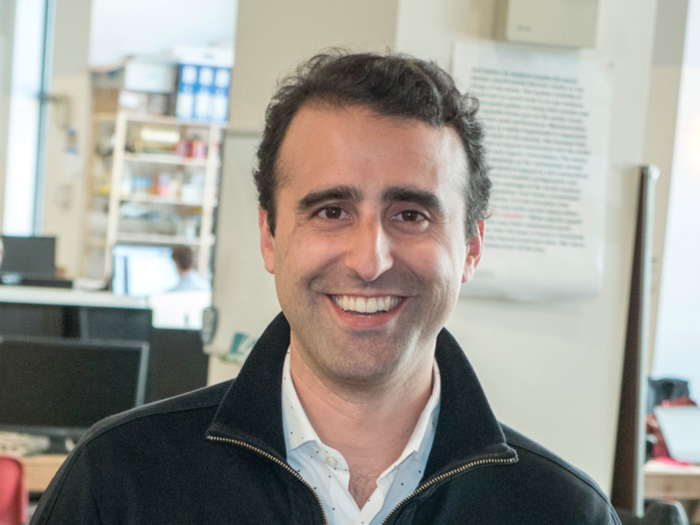
Nomad Health is a site that helps connect freelance clinicians to work in healthcare systems.
We have an all-hands meeting, which we call "morning rounds." It's a great way to kick off the day, and it's a kickoff for the whole team.
We talk about the important things that are going to happen today, and we review our high-level KPIs [key performance indicators] as a company. We celebrate wins from the last 24 hours. So if someone closed a big contract or we shipped a new product, we'll talk about it there.

Amino Apps uses apps to create communities around different topics.
I'm often spending more time with our China office because it's their evening at that point. I'm talking to the product team there, thinking through different ideas around new products and new features that we're developing, and weighing in on those.
Then I'll typically sync with the team here in New York.

Slice is a mobile app that lets you order from local pizzerias.
We have this Slice logo; it's a neon sign. I have this superstition around making sure that sign is lit up as soon as possible. So the first thing I'll do is make sure that logo is bright and shining that day. It's kind of like our spirit.
Aside from that, I'll check in with our team in Europe — we have a team of 200+ people there. I'll also catch up with Pete Chen, who is our president and COO and basically my business partner here, and we'll sync on what we're tackling that day.

Dia&Co is a clothing subscription service for women who wear size 14 and up.
Once I get to the office, I have a "do not schedule" blocked on my calendar for the first two hours. It is one I try incredibly hard to adhere to.
I find that if I can get through my most important tasks first thing in the morning, it helps me to not only feel more productive and more control of my day going forward, but it also helps me be more present in my meetings throughout the day.

Wheels Up is a membership-based private aviation company.
I walk around the office and I say "hello" to everybody. We're in the hospitality business, so it's important that I check in with all the troops.

Troops creates Slackbots for sales teams.
I'll quickly look over my email. If there's nothing urgent, I try to do something that is not reactive, that's more of a project-based piece of work that takes dedicated time. Generally, it's trying to get the most important thing done, which is not typically email.
For me, it's very easy once I get in email-reaction mode to be doing that all day and not doing any high-level work. So I try to avoid that as long as possible and try to knock out whatever the most important thing is.

Cadre is an online real-estate marketplace that connects approved sellers and high net-worth individuals.
Once I'm in the office, I like to use that time to respond to email.
I read a book recently called "Deep Work" by Cal Newport. The thesis is that it's really important to give yourself space to think. Your greatest insights often come when there's the fewest distractions.
To that end, I like to focus on email at six points in the day [the first is in the early morning] so I can spend most of my day focused on the big picture, which manifests itself in meetings with my management team.
 I spent $2,000 for 7 nights in a 179-square-foot room on one of the world's largest cruise ships. Take a look inside my cabin.
I spent $2,000 for 7 nights in a 179-square-foot room on one of the world's largest cruise ships. Take a look inside my cabin. Saudi Arabia wants China to help fund its struggling $500 billion Neom megaproject. Investors may not be too excited.
Saudi Arabia wants China to help fund its struggling $500 billion Neom megaproject. Investors may not be too excited. Colon cancer rates are rising in young people. If you have two symptoms you should get a colonoscopy, a GI oncologist says.
Colon cancer rates are rising in young people. If you have two symptoms you should get a colonoscopy, a GI oncologist says. Audi to hike vehicle prices by up to 2% from June
Audi to hike vehicle prices by up to 2% from June
 Kotak Mahindra Bank shares tank 13%; mcap erodes by ₹37,721 crore post RBI action
Kotak Mahindra Bank shares tank 13%; mcap erodes by ₹37,721 crore post RBI action
 Rupee falls 6 paise to 83.39 against US dollar in early trade
Rupee falls 6 paise to 83.39 against US dollar in early trade

Copyright © 2024. Times Internet Limited. All rights reserved.For reprint rights. Times Syndication Service.